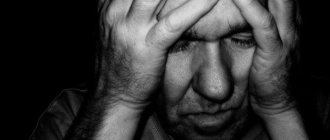Depression is a serious mental disorder that occurs for a variety of reasons and comes in many forms. The symptoms of depression are similar to bipolar disorder and blues. That is why it cannot be diagnosed by eye - errors in treatment can aggravate the condition.
But there is a simple way to self-diagnose - the Beck Depression Scale. With its help, any person will determine whether he is suffering from a mental disorder or whether it is just the blues.
Find out what the Beck Scale is, who it is for, and how to use it.
Description of the technique
Beck Depression Inventory
(Beck Depression Inventory) proposed by A.T. Beck in 1961 and developed on the basis of clinical observations, which made it possible to identify a limited set of the most relevant and significant symptoms of depression and the most frequently reported complaints by patients. After correlating this list of parameters with clinical descriptions of depression contained in the relevant literature, a questionnaire was developed that included 21 categories of symptoms and complaints. Each category consists of 4-5 statements corresponding to specific manifestations/symptoms of depression. These statements are ranked according to the increasing specific contribution of the symptom to the overall severity of depression.
In accordance with the severity of the symptom, each item is assigned values from 0 (the symptom is absent or minimally expressed) to 3 (the maximum severity of the symptom). Some categories include alternative statements of equivalent weight.
In the original version, the method was completed with the participation of a qualified expert (psychiatrist, clinical psychologist or sociologist), who read each item from the category out loud, and then asked the patient to choose the statement that most corresponds to his current condition. The patient was given a copy of the questionnaire, according to which he could follow the items read by the expert. Based on the patient's response, the researcher marked the appropriate item on the form. In addition to the test results, the researcher took into account anamnestic data, indicators of intellectual development and other parameters of interest.
Currently, it is believed that the testing procedure can be simplified: the questionnaire is given to the patient and filled out independently.
The score for each category is calculated as follows: each item on the scale is scored from 0 to 3 according to the increasing severity of the symptom. The total score ranges from O to 62 and decreases in accordance with the improvement of the condition.
Depression – how serious is it?
According to forecasts from the World Health Organization (WHO), depression will soon take first place among all diseases, overtaking cardiovascular diseases and infectious diseases.
Depression affects all age groups and even affects children. In addition, according to statistics, women have depressive disorders of varying degrees twice as often as men (compare: 20-26% among women, among men - only 8-12%).
The catalog of antidepressants is growing every year. And more and more people understand the seriousness of this disease and turn to a doctor.
Causes of depression
The causes of depression can be very different, among the main ones:
- neurological and endocrine diseases
- severe stress
- traumatic events
- lack of sunlight
- taking certain medications
Sometimes it can be very difficult to understand that a person has depression, and not the usual temporary blues, bad mood or a normal period of adaptation after difficult life situations.
Procedure
Instructions
“This questionnaire contains groups of statements. Read each group of statements carefully. Then identify one statement in each group that best matches how you felt THIS WEEK AND TODAY. Check the box next to the statement you selected. If several statements from one group seem equally good to you, then check the box next to each of them. Make sure you read all statements in each group before making your choice."
So how do you still understand that it is depression?
In simple terms, the key factor that you can focus on is that there are no objective reasons for a bad mood. There’s just a feeling that it’s bad, that’s all. And it is difficult to determine normal, understandable reasons from an everyday point of view.
Sometimes mild forms of depression can be managed on your own. Moreover, when we are dealing with a mild form, most likely, everything will improve on its own over time; our body can cope with a lot using its own internal resources.
But there are situations when you need to stop fighting yourself and finally go to the doctor. Simply because, at a minimum, it will be easier and faster to defeat the disease, and at a maximum, this is sometimes the only way, because not only psychology is involved, but also physiology.
So, if in doubt, it is better to consult a doctor. Only he will be able to adequately assess what help you need (or don’t need).
Treatment of depression
Treatment of depression usually requires the joint work of a psychologist and psychotherapist.
A psychologist will talk to a depressed person, help them sort out the situation and determine the essence of the problem. A good specialist will also look for secondary (unconscious, hidden) benefits of the disease, work with the client on traumatic events, and track non-obvious behavioral disorders and destructive features of thinking.
The psychotherapist, in turn, will prescribe medications appropriate to the situation that will help cope with the physiological manifestations of the disease. Please note that medication can only be prescribed by a specialist (psychotherapist or psychiatrist with an appropriate medical diploma!). You can’t take medications because “they prescribed it to a friend and it helped her.”
If you want to make sure right now that your condition is within normal limits, I suggest you use the Beck Scale, a special test for assessing the severity of depression.
Processing and interpretation of results
When interpreting the data, the total score for all categories is taken into account.
Adult version of the questionnaire
Total score
- 0-9 – absence of depressive symptoms
- 10-15 – mild depression (subdepression)
- 16-19 – moderate depression
- 20-29 – severe depression (moderate)
- 30-63 – severe depression
Subscales
- Items 1-13 – cognitive-affective subscale (CA)
- Items 14-21 – subscale of somatic manifestations of depression (SP)
Individual symptoms
It is also possible to separately assess the severity of 21 symptoms of depression:
- Mood
- Pessimism
- Feeling of inadequacy
- Dissatisfaction
- Guilt
- I feel like I'll be punished
- Self-loathing
- Self-blame ideas
- Suicidal thoughts
- Tearfulness
- Irritability
- Disruption of social connections
- Indecisiveness
- Body image
- Loss of performance
- Sleep disturbance
- Fatigue
- Loss of appetite
- Weight loss
- Involvement in bodily sensations
- Loss of libido
Teen version of the questionnaire
- Up to 9 points, satisfactory emotional state - 4 points,
- From 10 to 19 points, mild depression - 3 points
- From 19 to 22 points moderate depression - 2 points
- More than 23 points severe depression - 1 point
A depression level of 19 is considered clinically impaired; a level above 24 points indicates the need for therapy, possibly with the use of antidepressants. The goal of treatment should be to achieve a depression level below 10 points.
What can you do on your own if the situation is not critical?
Dream
Need more sleep. Usually a person needs 8 hours of sleep, your norm is 9-10 hours. Please note that sleep disturbances are common during depression. To normalize sleep, first of all, adjust your daily routine and sleep time. Try to go to bed and wake up (by alarm) at the same time, even on weekends. Also, create a routine for getting ready for bed. This is the same repeated sequence of actions that results in you ending up in bed (for example, a cup of herbal tea, airing the bedroom, washing your face). It is important that the room is really dark while sleeping. Close the curtains, turn off the night light. This is necessary in order to sleep better and normalize hormonal levels.
Movement
Often during depression you just want to lie down or sit and look out the window. But in this situation the statement is especially true: movement is life. It might even be worth buying a simple pedometer that will count for you how many steps you have taken and provide objective data on your activity throughout the day.
Nutrition
Even in normal conditions, people do not always watch their diet. And during depression, eating disorders often become the norm. Monitor the quality and timeliness of food intake, take vitamins if necessary. Ideally, keep a food diary.
Hormones
Hormone imbalance leads not only to gynecological diseases. Hormonal levels affect height, weight, skeletal structure, skin and hair condition. Failure in the production of hormones affects the emotional and physical state in general. At a minimum, get a blood test and check your sugar and thyroid hormone levels. Even better, consult an endocrinologist.
Light
Lack of enough daylight is one of the common causes of depression. This is why people who are predisposed to depression feel especially bad in the autumn-winter period, when the amount of light is limited. Those people who change their place of residence especially suffer from lack of light. If you or your parents have ever moved north from more southern areas, you are automatically at risk because your body has been genetically prepared for more sunlight.
What can be done?
- First, of course, take advantage of daylight hours as much as possible. Let your waking time coincide with daylight hours.
- Second - more lighting in the house, buy bright fluorescent lamps.
- And third, solarium often helps in small doses, literally 2-3 minutes per session, but regularly, several times a week.
Impressions and emotions
A depressed person often withdraws into himself and his thoughts. In this situation, new information that will move the brain is especially important. You usually don’t want to learn something new and complex, so you can just read books or watch movies. Even if you don’t feel like watching films, you can simply “be present”: the film will be playing in the background, and you can think about your own thoughts.
Help from loved ones
If you understand that you have depression (even in a mild form), do not hesitate to seek help from your loved ones and do not stop them from helping you, even when it seems that they are doing something wrong.
Even if we don’t say that psychological support is needed, ordinary help in everyday life is always needed. The fact is that when a person is depressed, he doesn’t want to wash himself, doesn’t want to cook food for himself, and often doesn’t want to get out of bed at all. And we need someone who will monitor such purely physiological indicators as food, sleep, hygiene. Someone who will kick you into the shower and monitor what and when a sick person eats.
Recommendations for relatives
It's no secret that helping a loved one who is facing depression is not an easy task. Therefore, here are some more recommendations for relatives and loved ones of a depressed person.
Introduce clear, understandable rules and demand their implementation
This is especially true for behavior in everyday life. Enter a daily routine, monitor the format of communication. Accept complaints calmly, but try not to encourage negative topics. All conversations are either about good things or to the point.
If there is any doubt that you can cope on your own, insist on visiting a doctor.
Yes, there is a certain difficulty here: a sick person often does not want anything at all, and it is difficult to persuade him. At the same time, you cannot force a person to go to the doctor or take medications, because he is considered fully capable. But don't give up trying, it's important.
Beck Questionnaire
In the basic version, the depression scale is presented in the form of 21 signs of a depressive state. They are divided according to the level of manifestations of the disease in the subject’s condition. In practice, these are two groups: the affective-cognitive scale and somatic manifestations. In principle, there are no particular difficulties in completing the questionnaire on your own.
You can take the Beck Depression Test online right now (you must select one answer):
- State of the day.
A) sadness.
B) disorder.
C) stable sadness and sadness.
D) impossible frustration and melancholy.
- State of the week.
A) I don’t think about the future.
B) I feel that I am puzzled by the future.
C) there is no confidence that a good future awaits.
D) the future is hopeless.
- Status.
A) I am a lucky person.
B) I have more successes than failures.
C) I experience more failures than successes.
D) I admit that I am an unlucky person.
- Satisfaction.
A) I feel completely satisfied with life.
B) I don’t get enough pleasure.
C) I am more often not satisfied with the results of my own actions.
D) tired of living from a feeling of absolute dissatisfaction.
- Guilt.
A) there is nothing to reproach yourself with.
B) sometimes there is a slight feeling of guilt.
C) it’s often my fault.
D) the soul is gnawing at guilt in all actions and deeds.
- Punishment.
A) there is nothing to punish me for.
B) I am preparing to be punished for some actions.
C) I often expect punishment.
D) all my life I have felt like a punished person.
- Disappointment.
A) I have never been disappointed in myself.
B) occasionally notes of disappointment are present in thoughts.
C) more often you have to be disappointed in yourself and people.
D) complete disappointment with life and with oneself.
- Self-esteem.
A) I am the best creature on the planet.
B) I criticize myself for minor mistakes and shortcomings.
C) I blame myself for all serious offenses.
D) everything bad happened only through my fault.
- Suicide.
A) I love life and want to live.
B) in a fit of passion, he wanted to end this world.
C) there was a repeated desire to commit suicide.
D) even now I can commit suicide.
- Tears.
A) I don’t cry and don’t recommend it to anyone.
B) tears come more often than usual.
C) I cry constantly.
D) I’m sobbing inside, but I can’t physically cry anymore.
- Irritability.
A) nothing irritates you more than the standard.
B) I notice that irritability has increased.
C) irritation is my middle name most days.
D) I feel irritable all day long.
- Sociality.
A) there is an interest in other people.
B) I show less interest in society.
C) I am more interested in myself.
D) there is no interest in society.
- Determination.
A) I make decisions quickly and clearly.
B) I notice doubts when making decisions.
C) the decision is very difficult to make.
D) there is no desire to make any decisions at all.
- Physical condition of the body.
A) the body looks decent.
B) I often try to correct defects in appearance.
C) I just work on my body.
D) I look terrible, and nothing can help me.
- Job.
A) I enjoy working and working.
B) I work, but without feeling happy.
C) I force myself to act under pressure.
D) I can’t do even basic work.
- Dream.
A) I sleep well and get enough sleep.
B) sometimes suffer from nightmares and insomnia.
C) I wake up several times during the night and can’t fall asleep right away.
D) unstable sleep, chronic insomnia.
- Fatigue.
A) I get tired at the end of the day.
B) I get tired after lunch.
C) I feel tired in the morning.
D) a constant feeling of total fatigue.
- Appetite.
A) I eat regularly and stick to a routine.
B) sometimes the appetite disappears.
C) the desire to snack is practically absent.
D) I have no appetite for a long time.
- Weight.
A) weight changes slightly.
B) constant changes in weight, but I don’t attach any importance to this.
C) I’m worried about my weight, but I’m trying to regulate it.
D) I’m constantly trying to lose weight and therefore I eat almost nothing.
- Health.
A) rarely worries about health.
B) minor disturbances often occur: pain, constipation, discomfort.
C) I often go to the clinic.
D) I think only about my health and nothing else.
- Sex.
A) I have sex when I want to.
B) I’m interested in sex a little less than before.
C) I almost lose interest in sex.
D) the desire to have sex is completely lost.
The specialist recommends keeping diaries of your condition regularly so that when you visit a specialist, the picture is extremely clear. This questionnaire for major depression is not a doctor, but only an assistant. If you need to get rid of a disease of the nervous system or similar disorders, you can contact a professional psychologist, for example, Nikita Valerievich Baturin.
Critical indicators
A score from thirty to sixty-three points indicates a severe depressive state. Such a diagnosis has characteristic symptoms, which include the following conditions:
- depressed state;
- insomnia;
- emotional disruptions;
- sadness;
- feelings of inferiority and uselessness;
- lack of interest in what is happening around;
- rapid fatigue that occurs after any activity;
- loss of appetite and weight loss;
- pessimism.
It is typical that such patients very often fall into a hysterical situation, sometimes even prone to aggression and violence directed at people around them. They have suicidal thoughts too often, so this condition requires urgent, high-quality treatment.











